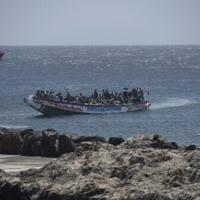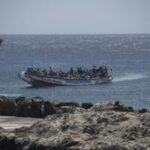Spain is currently facing a significant increase in the number of migrants arriving in the Canary Islands from Africa, sparking a heated debate on how to address illegal immigration in the country.
This issue gained national attention during a three-day visit by Spanish Prime Minister Pedro Sanchez to West Africa, which concluded on Thursday.
The purpose of this trip was to address the record number of unauthorized migrants reaching the Atlantic archipelago in search of a better life in Europe.
Sanchez stated that “Spain is committed to safe, orderly and regular migration” upon his arrival in Nouakchott, the capital of Mauritania, marking the first stop of his tour that also included Gambia and Senegal.
He advocated for “circular migration” programs that enable individuals to enter Spain legally to work for a limited duration in sectors like agriculture, which face labor shortages during certain times of the year, before returning to their home countries.
Sanchez emphasized that “immigration is not a problem, it is a necessity that comes with certain challenges.”
His remarks were met with criticism from Spain’s main opposition party, the Popular Party (PP), who argued that such statements could encourage more migrants to attempt illegal entry into the country, especially given the current strain on resources in the Canary Islands due to the influx of migrants.
Almost daily, Spain’s coastguard is rescuing boats carrying dozens of African migrants towards the seven-island archipelago located off the northwest coast of Africa.
As of now, over 22,000 migrants have arrived in the Canary Islands this year, compared to just under 10,000 during the same period last year.
In 2023, the archipelago received a record 39,910 migrants, a number that is likely to be surpassed in the current year.
– ‘Irresponsible’ –
The PP leader, Alberto Nunez Feijoo, criticized Sanchez’s actions as “irresponsible” and accused him of promoting Spain as a desirable destination for migrants during a time when there is a major irregular migration crisis.
During the final leg of his tour in Dakar, the capital of Senegal, Sanchez highlighted the links between human trafficking networks organizing boat crossings to Spain and terrorist or drug smuggling groups, underscoring the importance of prioritizing security and the need to repatriate those who have illegally entered Spain.
However, the process of deporting migrants requires cooperation from their countries of origin, posing a significant challenge.
– ‘Contradictory’ –
Cristina Monge, a political scientist at the University of Zaragoza, noted that Sanchez’s statements in Africa appeared somewhat contradictory, trying to balance different perspectives on the issue. She pointed out that while he gained support from the right with his emphasis on security, he faced opposition from the left, including his coalition partner, Sumar, who opposed adopting conservative migration policies.
As the number of migrant crossing attempts is expected to rise in the coming weeks, especially with calmer Atlantic waters, the controversy is likely to escalate. The PP has taken a harder stance on immigration in response to the emergence of the far-right party Vox, which is openly hostile to migration.
The Spanish government estimates that around 200,000 individuals in Mauritania are waiting to migrate to the Canaries, with a majority coming from Mali, where a military regime is combating an Islamist insurgency.
chz/ds/yad/rsc





